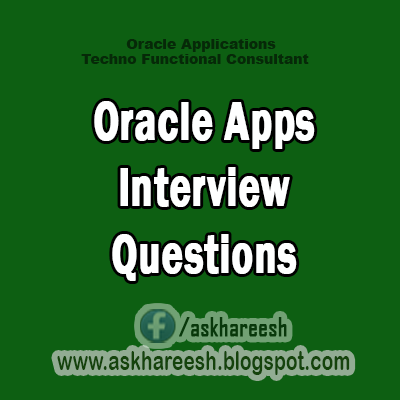
106)Why we use token field for Concurrent program?
107) What are the mandatory parameters in concurrent programs?
errbuf
errcode.
108)Those are IN or OUT parameters?
Out Parameters
109)What is Request group?
Responsibility is used for security reason like which Responsibility can do what type of jobs etc.
Set of Responsibility is attached with a Request group. When we attach the request group to a concurrent program, that can be perform using all the Responsibilities those are attached with Request group.
110)What is MultiOrg?
It is data security functionality in Oracle 10.6 and above. Applicable User responsibilities are created and attached to specific Operating Unit. User can access the data that belongs to the Operating unit they login under.
The benefit is it enables multiple operating units to use a single installation of various modules, while keeping transaction data separate and secure by operating unit.
It has an effect on the following modules:
- Order Entry
- Receivable
- Payable
- Purchasing
- Project Accounting
It is used for Proc*C in executable field
112)How can we call a Report from Form in Apps?
Thru concurrent prog
113) what are the setup we need to do before running into Oracle Apps?
Go to Oracle Apps > System Administraror (Responsibility) > Create a User using SSO > Add responsibility
Switch to COE Dev Sys Administrator (Responsibility) > Add the Responsibility that is attached to the newly created User > menue > exclude / include the function according to the requirement.
114) What is multi_org?
It is data security functionality in Oracle 10.6 and above. Applicable User responsibilities are created and attached to specific Operating Unit. User can access the data that belongs to the Operating unit they login under.
The benefit is it enables multiple operating units to use a single installation of various modules, while keeping transaction data separate and secure by operating unit.
It has an effect on the following modules:
Order Entry
Receivable
Payable
Purchasing
Project Accounting
115) What is the difference between po_headers & po_headers_all?
Here comes the concept of multi_org. po_headers contains data that is irrespective of multi_org i.e any supplier can view all the records. In case of po_headers_all
116) What is the basic requirement that we need to set before starting a form in Oracle Apps?
a) FTP the templet.fmb From $au_top/bin To Local m/c
b) Rename the templet.fmb as User defined name
c) Trigger Level Change: Pre_Form : app_window.set_window_position('BLK_ORG', 'FIRST_WINDOW'); -- 1st Window Name
set_window_property('BLK_ORG',title,'Form name') -- 1st Window Name, caption
Block Level Change: Rename Default_block
Form Level Change: Property Panel > Navigation > First Navigation Data Block > (Set A Block Name)
Program Unit Level: App_custom > (set the 1st window name)
118) What is the API we use to see the message from log file?
When we use an API, it automatically stores the error message in a pl/sql table i.e creating a log of the errors.
We can see those error messages thougt fnd_message_pub API
119)There is a check box called Use in SRS. What is its use?
SRS stands for Standard Request Submit. We can execute concurrent program by directly passing parameters. On checking this „Use In SRS‟ check box, we can independently use the concurrent program.
120)Do you know Extension table?
Unlike database table, it store outside the database like BFile (content store outside the DB but the location store in DB like pointer). It contains metadata only. So no DML operation (except SELECT, Group by, Order By) can possible.

No comments:
Post a Comment